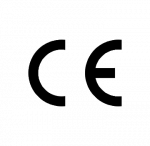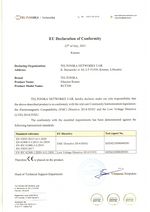RUT300 CE

The Electromagnetic Compatibility Directive (2014/30/EU) ensures that electrical and electronic equipment does not generate, or is not affected by, electromagnetic disturbance.
The Low Voltage Directive (2014/35/EU) ensures that electrical equipment within certain voltage limits provides a high level of protection for European citizens, and benefits fully from the single market. It has been applicable since 20 April 2016.
Description
The EMC directive limits electromagnetic emissions from equipment in order to ensure that, when used as intended, such equipment does not disturb radio and telecommunication, as well as other equipment. The directive also governs the immunity of such equipment to interference and seeks to ensure that this equipment is not disturbed by radio emissions, when used as intended.
The LVD covers health and safety risks on electrical equipment operating with an input or output voltage of between:
- 50 and 1000 V for alternating current
- 75 and 1500 V for direct current
EU legislation in the electrical sector is important to ensure that health and safety requirements are the same across Europe for products placed on the market.
Standards applied
The conformity with the essential requirements has been demonstrated against the following harmonized standards:
| Standard | Directive |
|---|---|
| EN IEC 62368-1:2020+A11:2020 | Low Voltage Directive 2014/35/EU |
| EN 55032:2015+A11:2020 EN 61000-3-3:2013+A1:2019 EN IEC 61000-3-2:2019 EN 55035:2017 |
EMC Directive 2014/30/EU |
Therefore ![]() is placed on the product.
is placed on the product.
Attachments
 |
To download a PDF version of the declaration, click here.
External links
Disclaimer:
Test reports that are referenced in declarations and certificates can be provided upon request. For the request to be approved, the recipient of the test reports should be a certification authority or certified test house. The recipients will be asked to sign a non-disclosure agreement (NDA).
